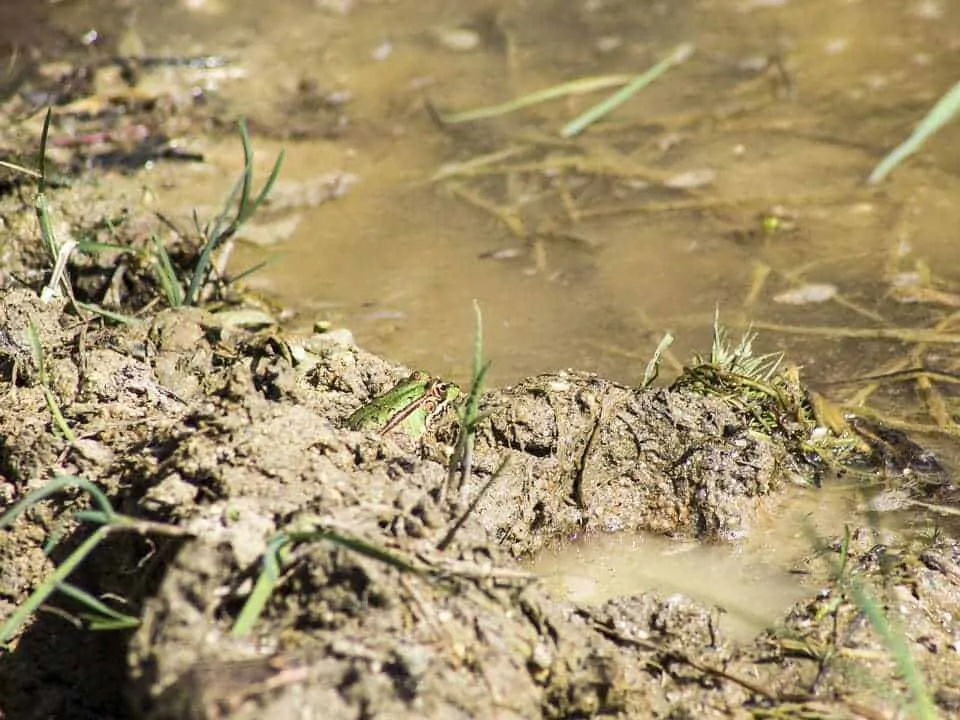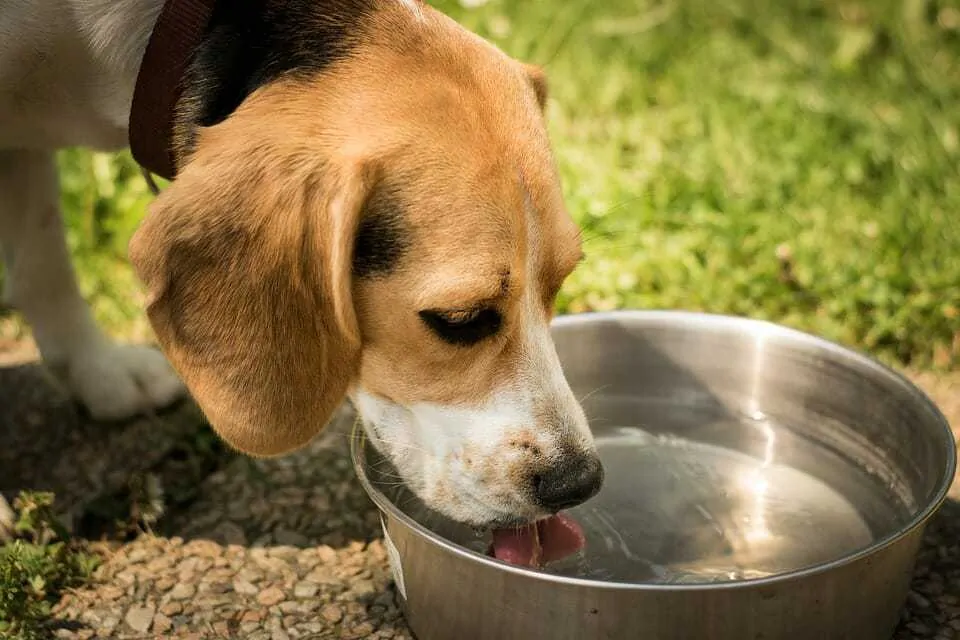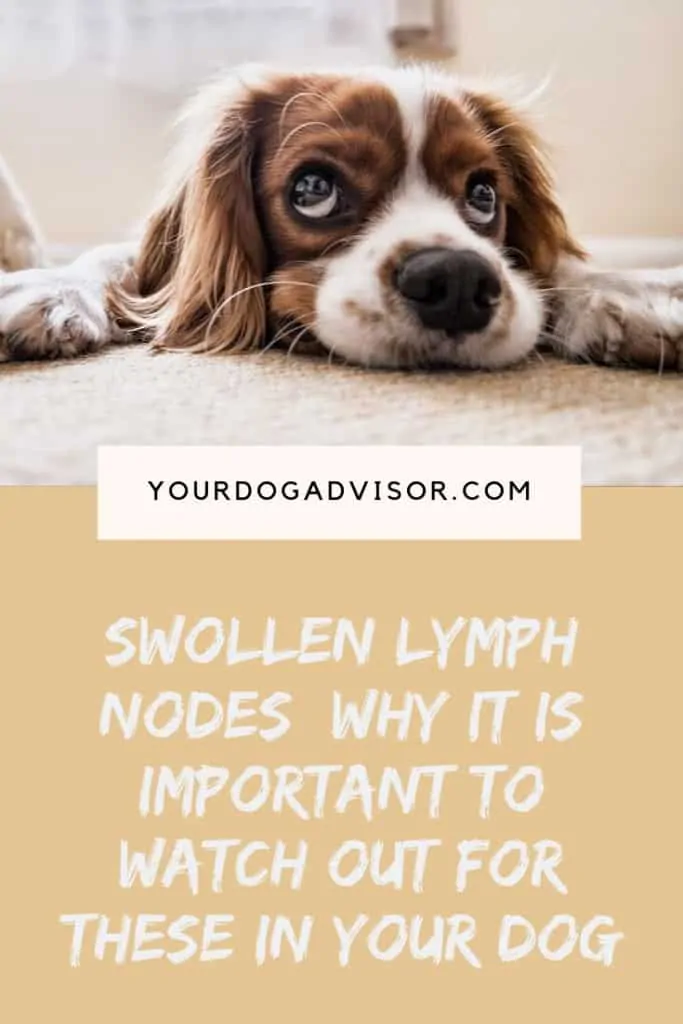Dog swollen lymph nodes usually indicate that there is an underlying infection or disease that your dog’s body is trying to fight off. Whilst it can often be something simple to deal with, it can also be an indication of something more serious so understanding what the lymph nodes are, identifying when there are enlarged lymph nodes and getting prompt attention from the vet can be extremely important.
There are lymph nodes found under the jawline, just behind the ear of your dog, and these are one of those most noticeable if they are swollen
Contents
What Are Your Dog’s Lymph Nodes?
Your dog’s immune system is designed to help them fight off illness or disease. A crucial part of this is the lymphatic system. The lymphatic system circulates a clear fluid called lymph via a network of many tiny vessels towards the heart. Lymph contains white blood cells called Lymphocytes and these contain T and B cells which are known as being defender cells. It also transports nutrients and oxygen to cells and helps to rid them of waste products.
The highest concentration of Lymphocytes is in the lymph nodes, these are small bean-shaped glands located in various parts of the body and they are linked through the lymphatic system. Because of their high concentration of defender cells the lymph nodes can become inflamed if your dog is trying to fight off a virus or infection.
Where Are They Located on Your Dog?
There are a number of lymph node areas in your dog. There are 5 major sites on each side of your dog’s body where the lymph nodes are more easy to identify.
- The most commonly visible ones are the two that are located beneath the jaw, just below the ears, the technical name is the Submandibular lymph nodes.
- There are also two found in the armpits at the top of the rib cage, called the Axillary.
- Those found in the groin area, called the Inguinal.
- Those found above the knees on the rear legs, called the Popliteal.
- Those in the shoulder region, called the Prescapular.
Two more lymph nodes are located in the groin are and in the armpits of the front legs. These can also become swollen.
How Do I Know If There are Swollen Lymph Nodes?
When your dog has an infection or virus of some sort in their system the body can detect this and will try to fight it off. The lymph nodes will react to the infection and can increase in size / become swollen as a result. When your dog’s lymph nodes enlarge this is referred to as Lymphadenopathy. So if you suddenly notice a lump in any of the areas described above that you have not before then it could be an indication that your dog is trying to fight off some sort of infection or disease.
Why It Is Important to Seek Veterinary Advice Quickly?
While enlarged lymph nodes are often not a sign of anything serious, it is very important that you consult with your vet as soon as you notice that they are different from normal. Unfortunately, enlarged lymph nodes can also be a sign of cancer and the earlier that this is detected the better the long term prognosis could be. If not unchecked, it could affect your dog’s quality of life.
What Can Cause Your Dog’s Lymph Nodes to Swell?
Swollen lymph nodes can be caused by a number of different things some of them include the following:
Infections
One of the most common reason is your dog has a viral or bacterial infection and, as they try to fight this off, the lymph nodes can swell.
A common cause of swelling or enlargement of the Submandibular lymph nodes, those just underneath the jaw, is Strep Throat , which is also a common condition in humans too. Your dog may also show signs of coughing, a high temperature and be less active than normal. Good hygiene and clean sleeping quarters can help reduce the risk of your dog catching this type of infection.
Infections are also commonly contracted from other dogs, parasites or from the outdoor environment (stagnant water, rotting forest areas etc). Leishmania, for example, is a parasitic infection that affects dogs and the lymph nodes swell after a dog has contracted this condition.
Often, when the infection is mild, your dog may be able to fight it off without needing any additional treatment but, if the lymph nodes start to swell, it is always best to get the lymph node checked out by the vet. Sometimes antibiotics or anti-fungal medication may be needed to give the body a helping hand and it is also important to have the vet rule out any other possible diagnosis too.
Sometimes you can’t prevent your dog from contracting an infection but things maintaining good hygiene around the home and preventing them from accessing dirty water or going into areas of rotten woods etc are sensible precautions
Common Cancer – Dog Lymphoma
Cancer that sits in the lymph nodes in dogs is referred to as Lymphoma. Dog Lymphoma is one of the most common types of cancers.
Why Do Dogs Get Canine Lymphoma?
Any dog can develop this type of cancer but, it is believed that there are some dogs that may have a genetic predisposition towards developing the condition. Some of the breeds that are shown to be at greater risk of contracting lymphoma in dogs include Rottweilers, Boxers, Bulldogs and Golden Retrievers.
It can affect a dog at any age too, but it does tend to be dogs ranging from middle to older age more commonly.
There is very little concrete evidence as to why other dogs will develop dog lymphoma currently although there are believed to be possible links with certain viruses and bacterias and even environmental factors.
A study published in the Environmental Research Journal in 2012 reported that it appears that lawn care products can produce an increased risk for developing dog Lymphoma. It stated that professionally applied pesticides could increase a dog’s risk by up to 70%. It also stated that there could be a greater risk for those using self-applied insect growth regulators.
There was also a report published by the Journal of Veterinary Internal Medicine in 2001 that suggested that there is also a link between developing lymphoma and the use of paints and solvents in the home and a dog’s proximity to Industrial areas.
It is believed that professionally applied pesticides can greatly increase a dogs chance of developing lymphoma if they have contact with them
Where and How Does Lymphoma Occur?
There are a large number of types of lymphoma that dogs can develop and they can impact a number of different areas within the body. While most of them affect areas that are linked to the dog’s immune system, they can also affect other areas including the skin, mouth and the intestines. Multicentric Lymphoma, the one that impacts on the lymph nodes that can be palpated externally, is the most common. Of the various types of lymphoma, multicentric lymphoma accounts for roughly 85% of cases.
Lymphoma is usually categorised in five different stages.
- Stage 1 – One lymph node or lymphoid organ is infected with cancer
- Stage 2 – When more than one lymph node in the same area is infected
- Stage 3 – When more than one lymph node across different areas is infected
- Stage 4 – When it has spread to the liver or spleen
- Stage 5 – When it has spread to the bone marrow or blood and possibly other organs as well as the liver and spleen
What Are the Symptoms of Lymphoma in Dogs?
Symptoms will vary in each individual case. It will depend on how far the disease has progressed, where in the body it is affecting and the type of lymphoma it is. Many dogs do not experience any obvious symptoms in the early stages of the disease.
The most obvious symptom is the swelling of one of the externally palpable lymph nodes, although they are generally not painful to the touch. It is important not to panic if you do discover a swollen lymph node though as, remember, these can be caused by many much less worrisome conditions too.
Some other symptoms could possibly include weight loss, excessive thirst, respiratory issues, a high temperature or fever and there can even be swelling in other areas of the body (not just of the lymph nodes).
Symptoms of Lymphoma can vary greatly but can include weight loss, lethargy and increased thirst
How is Lymphoma Diagnosed?
Often your vet will initially aspirate the swollen lymph node to get an understanding of what they are dealing with. From here, if further testing is required this often involves blood and urine tests and your dog may require x rays, radiographs or ultrasound to further assess the extent of the disease.
Treatment of Lymphoma
The good news is that lymphoma is one of the most treatable of all the canine cancers. If a dog receives treatment quickly enough, while there is no cure, the disease can often be successfully managed and it can significantly prolong your dog’s life.
The treatment will depend on what stage the disease is at and the type. A course of chemotherapy is often the most common treatment plan. Dogs tolerate chemotherapy a lot better than humans. Radiation therapy is sometimes also used and many owners, in conjunction with their vets, will also look at the use of alternative treatments including supplements, diet and homoeopathy.
Allergies
An allergic reaction can sometimes cause the lymph nodes to swell. Not all allergies or reactions will trigger Lymphadenopathy though. Often symptomatic treatment like antihistamines or immunotherapy drugs will help to deal with a reaction like this and the lymph nodes will return to normal as a result. For more serious allergies, more long term treatments options may be required and a process of elimination may be required to work out what triggered the reaction.
Allergic reactions can sometimes trigger the lymph nodes to swell
Autoimmune Conditions
Autoimmune Conditions relate to when the immune system has an abnormal response and mistakenly attacks your dog’s body, even when there is no illness or infection that requires that response. There are a number of different types of autoimmune conditions that can affect your dog and they will often target a specific area or organ in the body but sometimes they can impact on multiple areas.
Because your body has this response, it can trigger the lymph to start working to fight off whatever it thinks is happening to your dog’s body and, consequently, this can result in your dog’s lymph nodes swelling. There will usually be a number of other symptoms that go along with this though that will help your vet make a diagnosis.
Some of the more common autoimmune diseases that can affect dogs include:
Addison’s Disease
Addison’s Disease is a hormonal disorder. Cortisol and Aldosterone are two adrenaline gland hormones that are not produced enough causing this disease. Your dog can start to become very lethargic and possibly even depressed (cortisol can help your dog fight off stress), they can become dehydrated and have gastrointestinal issues so may vomit or have diarrhoea.
Most dogs with Addison’s can receive a very good prognosis as there are a number of effective oral medications that can be prescribed.
Lupus
Lupus is another condition where the body attacks its own cells and tissues. There are two types, the more common and less serious Discoid Lupus Erythematosus (DLE) and the more serious but very much rarer Systemic Lupus Erythematosus (SLE). Both of these conditions can sometimes result in lymph nodes swelling as part of their symptoms but they are more commonly enlarged in cases of SLE because of the severity of the condition.
DLE affects the skin and this is commonly localised around the nose and face. SLE can affect any part of the body and the severity of the case will depend on which organs may be targeted.
DLE is often mistaken for other conditions such as ringworm due to the scaly, crusty and flaky patches of skin that crop up as part of the symptoms. It is important to consult with a vet to allow a proper diagnosis to be established.
SLE can have much wider-ranging symptoms and these can also greatly vary in their severity. Along with lymph nodes swelling you may also see lameness and muscle pain, hair loss, lethargy, seizures, sores developing on the body or ulcers in the mouth.
While it is still very rare, some breeds are more genetically predisposed to the risk of developing SLE and they include German Shepherds, Poodles and Beagles.
DLE is usually easily diagnosed by obtaining a skin biopsy. SLE can be more difficult to diagnose because the symptoms can seem like those of a number of other possible conditions too. Often blood tests are required to rule out possible other causes and your vet will be looking for evidence of antinuclear antibodies in the blood as these are present when a dog has SLE.
Steroids and antibiotics are commonly administered for dogs with DLE with good results.
SLE treatment varies depending on the severity of the case and the organs that are impacted. Immunosuppressive drugs are often used and sometimes chemotherapy is recommended to further support the immune system activity and to help control any pain. It is not a condition that can be cured and treatment will be ongoing.
Sunlight can worsen both the conditions so care must be taken in terms of exposure
Stress
It is believed that, in some cases, severe anxiety can possibly trigger swollen lymph nodes. I couldn’t find much scientific evidence to corroborate these claims but, if you have a highly anxious or over-aroused dog there is a chance that this could potentially lead to them having lymph nodes that swell up on occasion. It is always still extremely important to consult with your vet to check there is no further underlying cause though and work on a programme to help lessen your dog’s fears and anxieties to help them lead a happier life too.
There may be a link between swollen lymph nodes and stress. It is important to help your dog learn to relax
Hope this guide on dog swollen lymph nodes was helpful and will encourage you to pay attention to your dog’s health condition before it becomes life threatening.

Gemma is an official dog nut and passionate traveller. Originally from the wonderful city of Edinburgh in Scotland, Gemma is now wandering across Europe with her rescue dog Annie. For ten years Gemma loved being surrounded by all things canine 24/7 whilst she ran a specialist doggy shop. The shop was a great community hub and, along with working closely with local rescues, Gemma provided customer support relating to canine behaviour and nutrition. It was a passion project and one that Gemma felt privileged to have created. She is also studying towards an Advanced Diploma in Canine Behaviour and is a huge advocate of dog rescue and promoting scientific methods of dog training.







